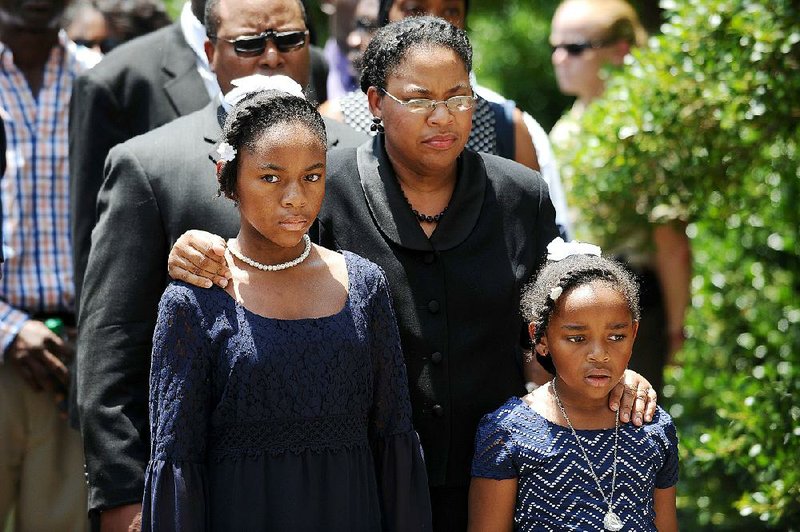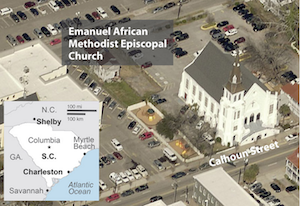Correction: This article that relied on information from The Associated Press incorrectly stated that the Rev. Clementa Pinckney was the first black person since Reconstruction to rest in honor in South Carolina’s Statehouse Rotunda. In 1986, astronaut Ronald E. McNair, who died in the space shuttle Challenger explosion, was given the same honor.
COLUMBIA, S.C. -- The Confederate flag flew high Wednesday outside the South Carolina Statehouse, but a large drape kept mourners from seeing it as they filed past the open coffin of a veteran black lawmaker and pastor.
State senator and pastor Clementa Pinckney was carried Wednesday into the Statehouse where he served the people for nearly 20 years, becoming the first black person since Reconstruction to rest in honor in the South Carolina rotunda.
Hours later, his congregation returned to the scene of the massacre that killed Pinckney.
Meeting for Wednesday night Bible study one week after the church leader and eight others were fatally shot, people packed the basement of Charleston's Emanuel African Methodist Episcopal Church to show their faith and restore their sanctuary.
The killings have led to soul-searching beyond Charleston.
In state after state, the Confederate symbols embraced by the suspect in last week's massacre have come under attack. South Carolina Gov. Nikki Haley started the groundswell Monday by calling on state lawmakers to debate taking down the Confederate battle flag flying in front of the Statehouse.
Alabama's governor was able to act much more swiftly, issuing an executive order to take down four of the flags Wednesday on the Capitol grounds.
In Montgomery, where the Confederacy was formed 154 years ago and where Jefferson Davis was elected its president, Gov. Robert Bentley, a conservative Republican, compared the banner to the universally shunned symbols of Nazi Germany, a reversal in a region where the flag has long played a cultural role.
The Confederate battle flag in particular "is offensive to some people because unfortunately, it's like the swastika; some people have adopted that as part of their hate-filled groups," Bentley said.
In South Carolina, making any changes to "heritage" symbols such as the Confederate flag requires a two-thirds supermajority of both houses of the state Legislature. Prodded by Haley, lawmakers voted for a debate over the matter later this summer, but the flag at the Statehouse will stay put until then.
As mourners filed by Pinckney's open coffin Wednesday, a makeshift drape over a second-floor window obscured the flag outside.
The 41-year-old Pinckney, named lead pastor at Emanuel African Methodist Church in 2010, spent a lot of time in the lobby, where five state senators and two former governors greeted mourners. Pinckney first arrived at the Statehouse as a page and in 1997 became the youngest black member elected to the House at that time. He became a senator in 2001.
Those honoring him also had to file past a statue of John Calhoun, the vice president who argued in the 1820s and 1830s that slavery was a "positive good" and that states should be able to pick the federal laws they want to follow.
Other conservative Republicans around the country weighed in Wednesday on the future of such Civil War-era symbols.
Both of Mississippi's Republican U.S. senators and a U.S. representative endorsed removing the Confederate symbol from the flag the state has flown since Reconstruction, even though the state's voters decided to keep it back in 2001.
"As the descendant of several brave Americans who fought for the Confederacy, I have not viewed Mississippi's current state flag as offensive," Sen. Roger Wicker said. "However, it is clearer and clearer to me that many of my fellow citizens feel differently and that our state flag increasingly portrays a false impression of our state to others."
Sen. Thad Cochran also declared his view a day after Attorney General Jim Hood, the only Democrat holding statewide office in Mississippi, said, "You've got to ask yourself the question: What would Jesus do in this circumstance?"
Other lawmakers and activists took aim at symbols including a bust of Confederate general and Ku Klux Klan leader Nathan Bedford Forrest in Tennessee's Senate chamber, a sculpture of Confederate President Jefferson Davis in the Kentucky rotunda, vanity license plates used by thousands of motorists in several states, and Minnesota's Lake Calhoun.
Many said change is imperative after shooting suspect Dylann Storm Roof, a 21-year-old white man, was charged with nine counts of murder.
Roof was captured after a motorist spotted his Confederate license plate. Images on a website created in his name months before the attacks show him posing with the Confederate flag and burning and desecrating the U.S. flag.
He also is seen posing at Confederate museums, former slave plantations and slave graves. In an essay on the same website, the writer wishes every white person had a chance to brutalize blacks before the Civil War.
Roof has been appointed federal public defenders, and Justice Department officials are in agreement that the massacre satisfies the definition of a hate crime, which means federal charges are likely, according to a federal law enforcement official. The official spoke on condition of anonymity because the investigation is continuing.
FBI analysts have also concluded "with a high degree of certainty" that Roof posted a racially charged manifesto online, which could be a key to any federal charges, another law enforcement official said. The website was registered in February under Roof's name, but the name was made anonymous the following day.
Attorney General Loretta Lynch, while declining to discuss details of the investigation, said Wednesday that hate crimes are "the original domestic terrorism."
Symbols defaced
Businesses also have acted swiftly in rejecting Civil War-era symbols. Wal-Mart, e-Bay, Amazon, Target and Sears are among those saying Confederate-themed merchandise will be gone from their stores and online sites. At least three major flag-makers said they will no longer manufacture the rebel battle flag.
On Wednesday evening, the National Park Service called on concessionaires to stop selling items with the Confederate flag.
National Park Service Director Jonathan Jarvis said in a memorandum that clothing, stickers or other items that use the flag as a stand-alone feature should be removed from the stores. Books and other media depicting the flag in its historical context may remain.
And Warner Bros. announced Wednesday that it will no longer license toy cars and models of the "General Lee" car with the Confederate flag on its roof, which was featured in the 1980s TV show Dukes of Hazzard.
For some in the South, this is all happening too fast.
Ben Jones, the actor who played Cooter on Dukes of Hazzard, said these symbols are under attack by a "wave of political correctness" that is vilifying Southern culture. He said Confederate items will never be removed from the Cooter's Place stores he owns in Tennessee and Virginia.
"We're not changing anything in stores. There's no reason to change anything," Jones said. "We despise racism."
He added, "It's not a hateful symbol, and we despise that it's being used by bigots and hate groups."
Meanwhile, a growing number of Confederate symbols have been defaced by graffiti.
The words "Black Lives Matter" were spray-painted Wednesday on a century-old Confederate memorial in St. Louis, not far from Ferguson, Mo., where the phrase took root after a white officer killed an unarmed black man last August.
The monument's future was in doubt even before the South Carolina killings. Mayor Francis Slay in April directed city Human Services Director Eddie Roth to confer with groups such as Forest Park Forever and the Missouri History Museum, then make a recommendation by the end of the summer on whether changes should be made.
In Charleston, the words "racist" and "slavery" were painted Tuesday on a monument to Calhoun, just a block from where Emanuel AME church stands on Calhoun Street.
Historian Robert Chase said the vandalism reflects anger over deep-seated racism.
Rick Wade, a senior adviser on President Barack Obama's campaigns in South Carolina, said he wants more than monuments and flags to come down from statehouses.
"I want the flag to come down in our hearts. There has to be a deeper conversation," Wade said. "We as individuals have to look in the mirror and make sure you don't have a flag of hate waving in your heart."
The few lawmakers openly defending the Confederate flag include Republican Jonathon Hill. The freshman South Carolina state representative said it should remain above the monument to fallen Confederate soldiers and that addressing it now disrespects the families of the South Carolina victims.
But as Alana Simmons made funeral arrangements for her grandfather, Emanuel AME pastor Daniel Simmons Sr., she said the relatives are glad to see South Carolina and other states taking action.
"We appreciate the efforts of the state to remove the flag," she said.
Information for this article was contributed by Seanna Adcox, Jeffrey Collins, Jonathan Drew, Meg Kinnard, Susanne M. Schafer, Jack Jones, Kim Chandler, Martin Swant, Eric Tucker, Jim Salter and staff members of The Associated Press; and by Matt Apuzzo, Michael S. Schmidt and Richard Perez-Pena of The New York Times.
A Section on 06/25/2015





